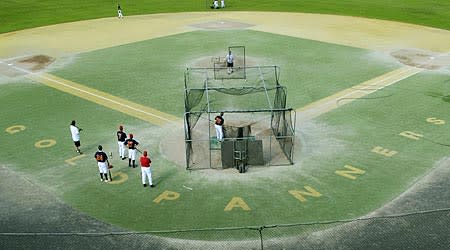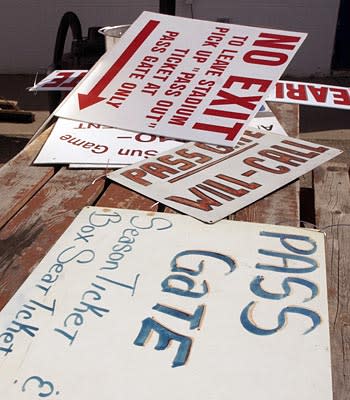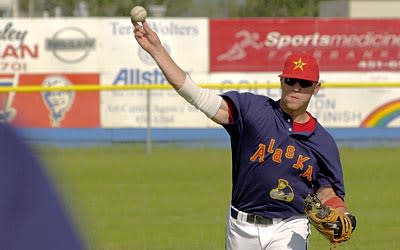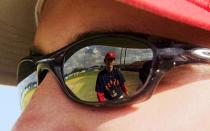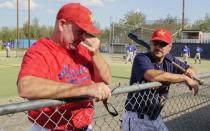Bats at midnight
FAIRBANKS, Alaska – The idea sounds just as crazy today as it did 101 years ago when a group of gentlemen drunk on booze and baseball hatched the greatest plan this state had seen since Seward's Folly.
Baseball at midnight with no lights.
All they needed was Apollo's gift: the Summer Solstice, which arrives every June 21 to bathe with sun a city that's farther north than North Pole, Alaska. So novel was this inspiration – the stunning convergence of nature and sport – that it became the game's longest hit. And today at 10:30 p.m. AKDT, the Alaska Goldpanners, a team comprising college kids from the mainland, will host the 102nd Midnight Sun Game, the only baseball contest that predates statehood by nearly 53 years.
|
Sort of like the Red Sox debuting in 1735.
"Playing baseball at midnight doesn't make any sense," said Bill Stroecker, a lifelong Fairbanksan and son of the Midnight Sun Game's founder, "until you realize there's nowhere else in the world you could do this."
Except for Antarctica on the Winter Solstice. And that might be great if not for the likely limb loss and gangrene.
Here, vitality blossoming, the summer sun beat down Wednesday. It was the only assault on the senses in a picture of placidity: Fairbanks smelled fresh, its air tasted sweet, and Growden Memorial Park, home of the Midnight Sun Game, was quiet but for a bird serenading Mother Nature.
Of all the places for nearly 200 eventual major-league players to spend their college summers, Fairbanks – Alaska's second-largest city with a population of about 30,000 – would seem as fitting as, oh, Ding Dong, Texas. Alaska's state sport is dog mushing. Fairbanks goes wild for its ice-carving tournament. Neither of those jibe with Tom Seaver, Dave Winfield, Michael Young, Jason Giambi, Graig Nettles, Terry Francona, Bob Boone, Jacque Jones, Alvin Davis, Bobby Crosby, Rick Monday and a skinny kid from Arizona State who, in 1983, was forced to move to first base because of an outfield glut.
Can't imagine that tickled Barry Bonds' funny bone.
|
"If you played at a college in California, you wanted to play in Alaska," said Tim Gloyd, the Goldpanners' shortstop in 1978 and its first-year coach this year. "And you wanted to play for Fairbanks. Because they're the ones who win."
Six National Baseball Congress titles attest to that, as does the talent that continues to funnel toward Fairbanks. Beau Mills, the Cleveland Indians' first-round pick earlier this month, played for the Goldpanners last year, and Gloyd compares this year's star, California junior college outfielder Chris Valencia, to another skinny kid he coached on the North Pole team 20 years ago: Luis Gonzalez. Tonight's starting pitcher, Ryan Platt, struck out 18 in a playoff game for Pierce Junior College in Woodland Hills, Calif., this spring.
The allure of the Midnight Sun Game helps steal away a few kids from better-known wood-bat leagues, such as the Cape Cod.
For one night, more than 4,000 people turn the tiny stadium into a standing-room-only festival. Most come straight from the downtown gala, where they have celebrated the solstice by gorging themselves on food and drink and games and sunlight. And they know that even if clouds creep above and the warm gloaming turns dark, never will anyone flick the switch that activates the light towers above Growden Park.
"There's always someone that wants the lights turned on," said Don Dennis, the Goldpanners' general manager. "You can't give away 102 years of tradition."
|
It began, no surprise, as a bar bet.
Eddie Stroecker was born and raised in San Francisco and uneducated past the fifth grade. He had played some catcher back at home and liked to tell the story how he duped Hall of Famer Frank Chance into striking out by calling a quick pitch. Similarly, Fairbanks lured Stroecker with the promise of quick riches via gold, and Stroecker struck out.
With Fairbanks' industry growing after its establishment in 1901, Stroecker still found work. He carried mail by dog sled and worked as a bill collector. He also helped build the foundation for a small bar along the Chena River called California's Saloon.
"There wasn't much to do in Fairbanks," said his son, now 87 years old. "There wasn't recreation to speak of. No automobiles. All they had to do was baseball."
So one night, no doubt emboldened by a libation or six, California's, led by Ed Stroecker, and the local Eagles Club agreed to a series of games. The Drinks vs. the Smokes, they called it.
The first game actually came before the solstice – with requisite hype nonetheless. Wrote The Fairbanks Daily Times on June 2, 1906: "No Kentucky feud will be more bitterly contested than the fight for supremacy on Sunday."
Eighteen days later came the first – and yet to be named – Midnight Sun Game, won by California's 7-4. The next year, a game-fixing scandal involving California's pitcher Ike McLaughlin – who, according to newspaper accounts, wasn't good enough to throw the game, then wasn't smart enough to keep his intentions from six teammates – ensured that interest wouldn't wane.
|
Baseball's popularity grew as Fairbanks expanded. Eielson Air Force Base and Ladd Field (now Fort Wainwright) brought thousands of troops to the surrounding areas, and the North of the Range League, with six military teams and two civilian teams, provided plenty of competition for the Midnight Sun Game. Some years, they played as many as four games at different sites.
When the Goldpanners formed in 1960, local families volunteered to host players for the summer. No longer did headlines read: "Freak ballgame draws large crowd." Fairbanks embraced its oddity.
The reciprocity wasn't immediate.
"Your mind doesn't comprehend it at first," Gloyd said. "You may be sitting at Denny's, just talking, and next thing you know it's 3:30.
"Well, once a year, we're allowed to forget that and just play."
The Goldpanners have won 14 consecutive Midnight Sun Games against 11 different teams. The opponents tonight, the Oceanside Waves of San Diego, lost the game in 1999 and 2001, though they did beat the Goldpanners in extra innings Wednesday night.
|
Earlier in the day, the Goldpanners spread out in the stands with buckets of water and sponges to tidy up for Thursday. Players scooped up trash, swept dirt and did everything except clear the thousands of empty peanut shells – who knows how old? – that lined the metal grates below the bleachers.
"No one even sits over here," one Goldpanner said.
"They will tomorrow," another replied.
Yes, they will brave the tire-popping potholes along 2nd Avenue to watch Sean Timmons, a Goldpanners legend, throw out the ceremonial midnight pitch, to stand proud for the Alaska Flag Song and to see the sun creeping over the Chena Ridge even at 12:47 a.m., when it will set. They will be there until the end, whether it's 1 a.m. or 2 a.m. or 3 a.m., though that doesn't matter much because the light will still be bright.
"It means more now than ever," Bill Stroecker said. A smile curled across his face. He adjusted his tie. He sat up a little straighter.
"We've always known it was something. Now the world knows."
